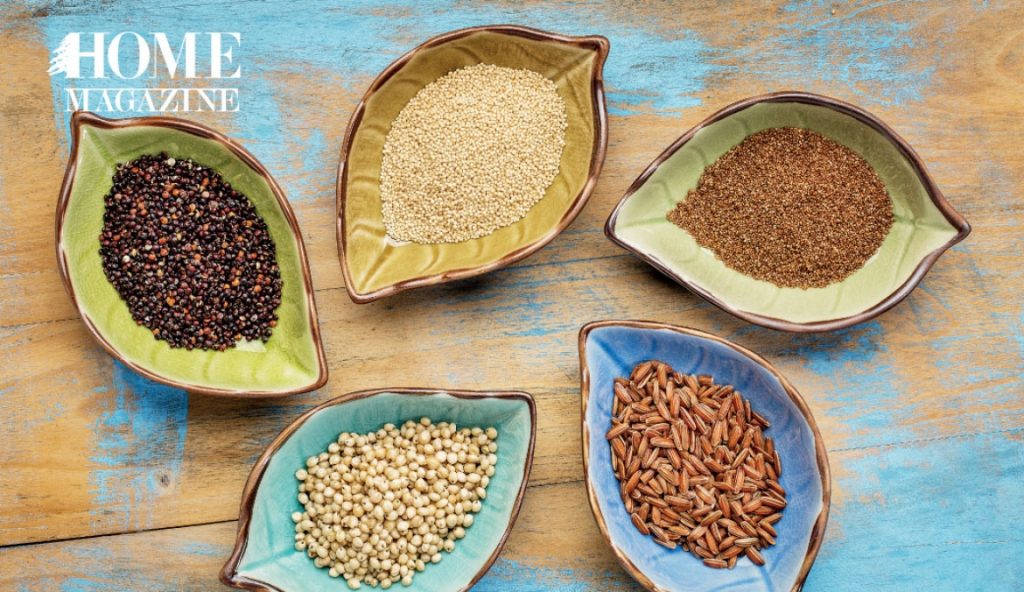While a gluten-free diet is a must for people with celiac disease, some people choose this diet to lose weight and improve their health. The question remains – whether to go gluten-free or not?
The gluten-free diet is a must for people with celiac disease. Ingestion of gluten in these individuals causes an adverse reaction which damages intestinal cells and can lead to potentially serious health problems. Symptoms of celiac disease include bloating, diarrhea, nausea, tiredness and headaches; which only happen if gluten is eaten. By avoiding gluten, the intestines will heal and the symptoms disappear.
This diet could also be helpful for people with gluten sensitivity and wheat allergy. But gluten-free diets are on the rise as a way for anyone to lose weight and improve their health, or just a way to make people feel better.
So, what is gluten?
Gluten is a protein found in grains, such as wheat, in all forms.
Which grains, starches and derivatives contain gluten?
Wheat (bulgur, couscous, biscuits, cakes, crackers, donuts, muffins, pasta, pastry, pies, farina), semolina, rye, barley spelt, kamut, matzo and triticale.
What should you do if you have been diagnosed with celiac disease or gluten intolerance, or you simply decide to go gluten-free?
- Read labels
While at the supermarket, be sure to look at the labels. Labels will indicate whether the products have gluten within them. The following foods often contain gluten; a look at the labels will help in your trip to the supermarket:
Malt / malt flavoring, root beer (barley), vodka, wine, soups, commercial bullion and broths, non-dairy creamer, flavored coffees and teas
Cold cuts, processed cheese, blue cheese, sausage, imitation crab meat, bacon Mayonnaise, ketchup, malt vinegar, soy sauce and teriyaki sauces, salad dressings, gravy marinades
Fried vegetables/tempura, French fries (often dusted with flour before freezing), hydrolyzed vegetable (wheat) proteins, veggie burgers
Cereals commercially prepared, breaded foods, wafers, oats (unless certified GF), oat bran (unless certified GF), communion wafers
Energy bars, trail mix, roasted nuts
- Remember… lots of foods are naturally gluten-free
Fresh fruit and vegetables, meat, poultry, fish, pulses (beans, lentils and chickpeas), cheese and eggs as well as oils are naturally gluten-free, so use these as the basis to your meals.
- Enjoy these gluten-free cereals: Quinoa, teff, amaranth, polenta, buckwheat, corn, millet and tapioca are just some of the naturally gluten-free grains which can be included in the diet. Pasta: choose pasta made from rice, quinoa, corn or buckwheat.
Baking: use flour of lentil, red bean, chickpea, or cornflour.
Bread: rice flour, blend of corn and potato flour, buckwheat or tapioca flour could be used in bread baking.
So, are there any downsides to going gluten-free?
One downside with going low-gluten is that it could cut out major sources of dietary fiber – which, research suggests, helps ward off type 2 diabetes and other chronic illnesses.
A gluten-free diet may have another downside: increased blood levels of arsenic and mercury found in foods containing rice instead of wheat (e.g. rice cakes and rice breakfast cereals) – the rice absorbs lots of arsenic from the soil and contaminated water, which in turn increases the risk of some cancerous diseases.
A third downside is limiting your food choices, which could be really frustrating if not needed.
Would a gluten-free diet help me lose weight?
It is to be noted that if you do not have intolerance to gluten, then eliminating gluten and replacing it with other carbohydrates of the same quantity will not help you lose weight.
Most gluten-free diets may be higher in calories, as a lot of processed gluten-free foods contain more fat and/or sugar to compensate for flavor and texture changes which result from the removal of gluten. Any diet that is higher in calories is likely to promote weight gain, not weight loss.
Consult with your personal physician /dietitian / healthcare provider before giving up gluten.
Randa Dunya Fahd, host of the nutrition program “EatSmart” on MTV. Author of “Al Rashaqa Wal Soha.’’ Founder of a nutrition awareness program targeting school-aged children. Besides her clinics DCDC in Kaslik and Beirut, Randa owns a center named Berrylite that offers healthy meals tailored to fit all people and all events.
Tel: +961 3 240 203 | Facebook: DCDC-Randa Dunya Fahd
Tel: +961 71 535 515 | Facebook: Berrylite Health Center | Instagram: Berrylitehealthcenter

































